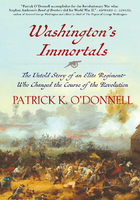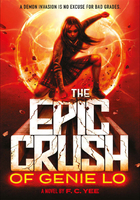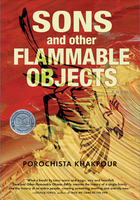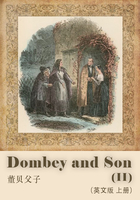Caitlin and Caleb hiked down the steep mountain face, heading towards the village of Nazareth. It was rocky, and they slid more than walked down the steep face, stirring up dust. As they went the terrain began to change, the rock giving way to clumps of weeds, the occasional palm tree, then to real grass. They finally found themselves in an olive grove, walking amidst rows of olive trees, as they continued further down, towards the town.
Caitlin looked closely at the branches and saw thousands of small olives, shimmering in the sun, and marveled at how beautiful they were. The closer they got to the town the more fertile the trees were. Caitlin looked down and from this vantage point had a bird's eye view of the valley and the town.
A small village nestled amidst enormous valleys, Nazareth could hardly be called a city. There looked to be only a few hundred inhabitants, only a few dozen small buildings, one story high and built of stone. Several of them appeared to be built of a white limestone, and in the distance, Caitlin could see villagers hammering away at the enormous limestone quarries surrounding the city. She could hear the soft ping of their hammers echoing, even from here, and could see the light limestone dust lingering in the air.
Nazareth was encased by a low, winding stone wall, maybe ten feet high, which looked ancient even now. At its center was a wide, open arched gate. No one stood guard at the gate, and Caitlin suspected they had no reason to; after all, this was a small town in the middle of nowhere.
Caitlin found herself wondering why they had awakened in this time and place. Why Nazareth? She thought back and tried to remember what she knew of Nazareth. She vaguely remembered once learning something about it, but she just couldn't remember. And why the first century? It was such a dramatic leap from Medieval Scotland, and she found herself missing Europe. This new landscape, with its palm trees and desert heat, was so foreign to her. More than anything, Caitlin wondered if Scarlet were behind those walls. She hoped—she prayed—that she was. She needed to find her. She couldn't rest until she did.
Caitlin walked through the town gate with Caleb and entered with a great sense of anticipation. She could feel her heart pounding at the thought of finding Scarlet—and of figuring out why they had been sent to this place to begin with. Could her Dad be inside, waiting?
As they entered the town, she was struck by the vibrancy of it. The streets were filled with children running, screaming, playing. Dogs ran wild, as did chickens. Sheep and oxen shared the streets, ambling about, and outside every home there was a donkey or camel tied to a post. Villagers walked casually about, wearing primitive tunics and robes, carrying baskets of goods on their shoulders. Caitlin felt as if she'd entered a time machine.
As they walked down the narrow streets, past small houses, past old women washing laundry by hand, people stopped and stared. Caitlin realized they must have looked so out of place walking down these streets. She looked down and noticed her modern clothing—her tight, leather battle outfit—and wondered what these people must have thought of her. They must have thought she was an alien that had dropped down from the sky. She didn't blame them.
In front of each house was somebody preparing food, selling goods, or working on their craft. They passed several families of carpenters, the man seated outside the home, sawing, hammering, building things from bed frames, to dressers, to wooden axles for plows. Before one house a man was building a huge cross, several feet thick, and ten feet long. Caitlin realized it was a cross meant for someone to be crucified on. She shivered and looked away.
As they turned down another street, the entire block was filled with blacksmiths. Everywhere flew anvils and hammers, and the ping of metal rang throughout the street, each blacksmith seeming to echo the other. There were also clay pits with large flames roasting slabs of red-hot metal, on which they were forging horseshoes, swords, and all sorts of metal work. Caitlin noticed the faces of children, black with soot, sitting by their father's sides, watching them work. She felt badly that the children worked at such a young age.
Caitlin looked everywhere for a sign of Scarlet, of her Dad, of any clue of why they were here—but she found none.
They turned down yet another street, and this one was filled with masons. Here, men chipped away at huge blocks of limestone, crafting statues, pottery, and huge, flat presses. At first, Caitlin didn't realize what they were for.
Caleb reached over and pointed.
"They're wine presses," he said, reading her mind as always. "And olive presses. They use them to crush the grapes and olives, to extract the wine and oil. See those cranks?"
Caitlin looked closely and admired the craftsmanship, the long slabs of limestone, the intricate metal work of the gears. She was startled to see what sophisticated machinery they had, even for this time and place. She was also startled to realize what an ancient craft winemaking was. Here she was, thousands of years in the past, and people were still making bottles of wine, bottles of olive oil, just like they were in the 21st century. And as she looked at the glass bottles, slowly being filled with wine and oil, she realized they looked just like the olive and wine bottles she'd used.
A group of children ran past her, chasing each other, laughing, and as they did, clouds of dust rose up and covered Caitlin's feet. She looked down and realized the roads were not paved in this village—it was probably, she figured, too small to be able to afford paved roads. And yet she knew that Nazareth had been famous for something, and it was bothering her that she could not remember what. Once again, she was kicking herself for not paying more attention in history class.
"It is the town where Jesus lived," Caleb said, reading her mind.
Caitlin felt herself redden once again, as he plucked the thoughts so easily from her mind. She withheld nothing from Caleb, but still, she didn't want him to read her thoughts when it came to how much she loved him. She might be embarrassed.
"He lives here?" she asked.
Caleb nodded.
"If we've arrived in his time," Caleb said. "Clearly, we are in the first century. I can see by their dress, by the architecture. I was here once before. It's a hard time and place to forget."
Caitlin's eyes opened wide at the thought.
"Do you really think he could be here now? Jesus? Walking around? In this time and place? In this town?"
Caitlin could hardly comprehend it. She tried to imagine herself turning the corner and running into Jesus in the street, casually. The thought seemed inconceivable.
Caleb furrowed his brow.
"I don't know," he said. "I'm not sensing he's here now. Maybe we missed him."
Caitlin was flabbergasted at the thought. She looked around her with a new sense of awe.
Could he be here? she wondered.
She was speechless, and felt an even greater sense of importance to their mission.
"He might be here, in this time period," Caleb said. "But not necessarily in Nazareth. He traveled a lot. Bethlehem. Nazareth. Capernaum—and Jerusalem, of course. I don't even know for sure if we are in his exact time or not. But if we are, he could be anywhere. Israel is a big place. If he were here, in this town, we would sense it."
"What do you mean?" Caitlin asked, curious. "What would it feel like?"
"I can't explain it. But you would know. It's his energy. It's unlike anything you've ever experienced before."
Suddenly, a thought occurred to Caitlin.
"Have you actually met him?" she asked.
Caleb slowly shook his head.
"No, not up close. Once, I was in the same city, at the same time. And the energy was overwhelming. Unlike anything I've felt before."
Once again, Caitlin was amazed by all the things Caleb had seen, all the times and places he had experienced.
"There's only one way to find out," Caleb said. "We need to know what year it is. But the problem is, of course, that no one started counting the years, like we do, until long after Jesus died. After all, our calendar year is based on the year of his birth. And when he lived, no one counted the year based on Jesus' birth—most people didn't even know who he was! So if we ask people what year it is, they'll think we're crazy."
Caleb looked around, carefully, as if searching for clues, and Caitlin did, too.
"I do sense that he's in this time," Caleb said slowly. "Just not in this place."
Caitlin examined the village with a new respect.
"But this village," she said, "it seems so small, so humble. It's not like a great, biblical city, like I would imagine. It just looks like any other desert town."
"You're right," Caleb answered, "but this is where he lived. It wasn't some grand place. It was here, among these people."
They continued walking and finally turned a corner and came to a small square in the center of town. It was a simple little square, around which were small buildings and in the center of which sat a well. Caitlin looked around and spotted a few elderly men sitting in the shade, holding canes, staring at the empty, dusty town square.
They made their way over to the well. Caleb reached out and turned the rusty crank, and slowly the weathered rope pulled up a pail of water.
Caitlin reached out, cupped the cold water with her hands, and splashed her face. It felt so refreshing in the heat. She splashed her face again, then splashed her long hair, running her hands through it. It was dusty and greasy, and the cold water felt like heaven. She'd give anything for a shower. She then leaned over, cupped some more, and drank. Her throat was parched, and it hit the spot. Caleb did the same.
They both finally leaned back, against the well, and surveyed the square. There didn't seem to be any special buildings, any special markers or clues of where they should go.
"So where now?" she finally asked.
Caleb looked around, squinting into the sun, holding his hands to his eyes. He seemed as at a loss as she.
"I don't know," he said flatly. "I'm stumped."
"In other times and places," he continued, "it seemed like churches and monasteries always held our clues. But in this time period, there is no church. There is no Christianity. There are no Christians. It was only after Jesus died that people began to create a religion after him. In this time period, there is only religion. Jesus' religion: Judaism. After all, Jesus was Jewish."
Caitlin tried to process it all. It was all so complex. If Jesus was Jewish, she figured, that meant he must have prayed in a synagogue. Suddenly, she had a thought.
"So then, maybe the best place to look is the place where Jesus prayed. Maybe we should be looking for a synagogue."
"I think you're right," Caleb said. "After all, the only other religious practice of that time, if you can even call it that, was paganism—the worshipping of idols. And I'm sure Jesus wouldn't worship in a pagan temple."
Caitlin looked around the town again, squinting, searching for any building that resembled a synagogue. But she found none. They were all just simple abodes.
"I don't see anything," she said. "All the buildings look the same to me. They're all just small houses."
"I don't either," Caleb said.
There was a long silence, as Caitlin tried to process it all. Her mind raced with possibilities.
"Do you think that my Dad and the shield are somehow connected to all this?" Caitlin asked. "Do you think that going to the places where Jesus was will lead us to my Dad?"
Caleb narrowed his eyes, as he seemed to think for a long time.
"I don't know," he said finally. "But clearly, your Dad is guarding a very great secret. A secret not just for the vampire race, but for all humanity. A shield, or a weapon, that will change the nature of the entire human race, for all time. It must be very powerful. And it seems to me, that if anyone was meant to help lead us to your father, it would be someone very powerful. Like Jesus. It would make sense to me. Maybe, to find one, we have to find the other. After all, it is your cross that unlocked so many keys to get us here. And nearly all of our clues we found in churches and monasteries."
Caitlin tried to take it all in. Was it possible that her Dad knew Jesus? Was he one of his disciples? The idea was staggering, and her sense of mystery around him deepened.
She sat there on the well, looking around the sleepy village, stumped. She had no idea where to even begin to look. Nothing at all stood out to her. And even more, she was feeling increasingly desperate to find Scarlet. Yes, she wanted to find her Dad more than ever; she felt the four keys practically burning in her pocket. But she saw no obvious way to use them—and it was hard to even focus on him with thoughts of Scarlet in her mind. The idea that she was all alone out there tore her apart. Who knew if she was even safe?
But then again, she had no idea where to look for Scarlet either. She felt an increasing sense of hopelessness.
Suddenly, a shepherd appeared through the gate, walking slowly into the town square, followed by his flock of sheep. He wore a long white robe and hood covering his head from the sun and headed towards them, holding a staff. At first, Caitlin thought that he was walking right to them. But then she realized: the well. He was merely coming to get something to drink, and they were in the way.
As he walked in, the sheep swarmed all around him, filling the square, all heading for the well. They must have known it was watering time. Within moments, Caitlin and Caleb found themselves in the midst of the flock, the delicate animals nudging them out of the way so they could get to the water. Their impatient bleating filled the air, as they waited for their shepherd to tend to them.
Caitlin and Caleb moved aside as the shepherd approached the well, turning the rusty crank, and slowly raising the pail. As he went to lift it, he pulled back his hood.
Caitlin was surprised to see that he was young. He had a large shock of blond hair, a blonde beard, and bright blue eyes. He smiled, and she could see the sun lines in his face, crinkling around his eyes, and could feel the warmth and kindness radiating off of him.
He took the overflowing pail of water, and, despite the sweat all over his forehead, despite the fact that he appeared thirsty, he turned and poured the first bucket of water into the trough at the base of the well. The sheep crowded in, bleating, muscling each other out of the way as they drank.
Caitlin was overcome by the strangest feeling that perhaps this man knew something, that perhaps he was put in their path for a reason. If Jesus lived in this time, she figured, maybe this man would have heard of him?
Caitlin felt a pang of nervousness, as she cleared her throat.
"Excuse me?" she asked.
The man turned and looked at her, and she felt the intensity in his eyes.
"We are looking for someone. I'm wondering if you might know if he lives here."
The man narrowed his eyes, and as he did, Caitlin felt as if he were seeing right through her. It was uncanny.
"He lives," the man replied, as if reading her mind. "But he is in this place no longer."
Caitlin could hardly believe it. It was true.
"Where has he gone?" Caleb asked. Caitlin heard the intensity in his voice, and could sense how desperately he wanted to know.
The man shifted his gaze to Caleb.
"Why, to the Galilee," the man responded, as if it were obvious. "To the sea."
Caleb narrowed his eyes.
"Capernaum?" Caleb asked tentatively.
The man nodded back.
Caleb's eyes opened wide in recognition.
"There are many followers on the trail," the man said cryptically. "Seek and ye shall find."
The shepherd suddenly lowered his head, turned, and began to walk away, the sheep following. Soon, he was heading across the square.
Caitlin could not let him go. Not yet. She had to know more. And she sensed that he was holding something back.
"Wait!" she cried out.
The shepherd stopped and turned, staring at her.
"Do you know my father?" she asked.
To Caitlin's surprise, the man slowly nodded back.
"Where is he?" Caitlin asked.
"That is for you to find out," he said. "You are the one who carries the keys."
"Who is he?" Caitlin asked, desperate to know.
Slowly, the man shook his head.
"I am merely a shepherd on the way."
"But I don't even know where to look!" Caitlin responded, desperate. "Please. I have to find him."
The shepherd slowly broke into a smile.
"Always, the best place to look is right where you are," he said.
And with that, he covered his head, and turned and crossed the square. He passed through the arched gate, and a moment later, he was gone, his sheep following.
Always the best place to look is where you are.
His words rang through Caitlin's mind. Somehow, she sensed it was more than just an allegory. The more she dwelled on it, the more she felt that it was literal. As if he were telling her there was a clue right here, where she was.
Caitlin suddenly turned and searched the well, the place they had been sitting. Now, she sensed something.
Always the best place to look is where you are.
She knelt down and ran her hands along the ancient, smooth stone wall. She felt all along it, feeling more and more certain that something was there, that she had been led to a clue.
"What are you doing?" Caleb asked.
Caitlin searched frantically, scanning all the cracks of all the stones, feeling she was onto something.
Finally, halfway around the well, she stopped. She found one crack that was slightly larger than the others. Just large enough to get her finger in. The stone surrounding it was just slightly too smooth, and the crack was just slightly too big.
Caitlin reached in and pried it open. Soon, the stone began to wiggle, then to move. The stone came loose, out of the base of the well. Behind it, she was amazed to see, was a small hiding place.
Caleb came close, huddling over her shoulder, as she reached down into the darkness. She felt something cold and metal in her hand, and pulled it out slowly.
She raised her hand into the light, and slowly opened her palm.
She could not believe what was in it.















